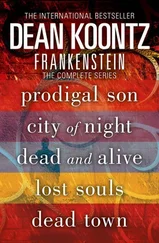He might not have this future-living thing down perfectly, but he was absolutely terrific at anger.
Maybe the watch wouldn't be discovered with the corpse. Maybe it would settle into the trash and not be found until archaeologists dug out the landfill two thousand years from now.
Maybes are for babies, Zedd tells us in Act Now, Think Later. Learning to Trust Your Instincts.
He could shoot Tammy Bean after he killed Bartholomew, do her before dawn, before the police tracked her down, so she wouldn't be able to identify “Eenie” for them. Or he could go back into the alley, climb in the Dumpster, and retrieve the Rolex.
As though the fog were a paralytic gas, Junior stood unmoving in the middle of the sidewalk. He really didn't want to climb into that Dumpster.
Being ruthlessly honest with himself, as always, he acknowledged that killing Tammy would not solve his problem. She might have told friends and colleagues about the Rolex, just as she had surely shared with her girlfriends the juiciest details about Junior's unequaled lovemaking. During the two months that he and the cat woman dated, others had heard her call him Eenie. He couldn't kill Tammy and all her friends and colleagues, at least not on a timely enough schedule to thwart the police.
An emergency kit in the trunk of his car contained a flashlight. He fetched it and sweetened the bribe to the valet.
To the alleyway again. Not through the clodhopper-cluttered gallery this time. Around the block at a brisk walk.
If he didn't find the Rolex and get back to his car before the reception ended, he'd forfeit his best chance of following Celestina to Bartholomew.
In the distance, the clang of a trolley-car bell. Hard and clear in spite of the muffling fog.
Junior was reminded of a scene in an old movie, something Naomi wanted to watch, a love story set during the Black Plague: a horse drawn cart rolling through the medieval streets of London or Paris, the driver ringing a hand bell and crying, “Bring out your dead, bring out your dead!” If contemporary San Francisco had provided such a convenient service, he wouldn't have had to toss Neddy Gnathic in the Dumpster in the first place.
Wet cobblestones and tattered blacktop. Hurry, hurry. Past the lighted casement window in the gallery men's room.
Junior worried that he might not locate the correct Dumpster among the many. Yet he didn't switch on the flashlight, suspecting that he would be better able to find his way if the conditions of darkness and fog were exactly as they had been earlier. In fact, this proved to be the case, and he instantly recognized the hulking Dumpster when he came upon it.
After tucking the flashlight under his belt, he grabbed the lip of the Dumpster with both hands. The metal was gritty, cold, and wet.
A fine carpenter can wield a hammer with an economy of movement and accuracy as elegant as the motions of a symphony conductor with a baton. A cop directing traffic can make a rough ballet out of the work. However, of all the humble tasks that men and women can transform into visual poetry by the application of athletic agility and grace, clambering into a Dumpster holds the least promise of beautification.
Junior levered up, scrambled up, vaulted over, and crashed into the deep bin, with every intention of landing on his feet. But he overshot, slammed his shoulder into the back wall of the container, fell to his knees, and sprawled facedown in the trash.
Having used his body as a clapper in the bell of the Dumpster, Junior had struck a loud reverberant note that tolled like a poorly cast cathedral bell, echoing solemnly off the walls of the flanking buildings, back and forth through the fogbound night.
He lay still, waiting for silence to return, so he could hear whether the great gong had drawn people into the alley.
The lack of offensive odors indicated that he hadn't landed in a container filled with organic garbage. In the blackness, judging only by feel, he decided that almost everything was in plastic trash bags, the contents of which were relatively soft-probably paper refuse.
His right side, however, had come to rest against an object harder than bagged paper, an angular mass. As the skull-rattling gong faded, allowing more clarity of thought, he realized that an unpleasant, vaguely warm, damp something was pressed against his right cheek.
If the angular mass was Neddy, the vaguely warm, damp something must be the strangled man's protruding tongue.
With a thin hiss of disgust, Junior pulled away from the thing, whatever it was, withdrew the flashlight from his belt, and listened intently for sounds in the alleyway. No voices. No footsteps. Only distant traffic noises so muffled that they sounded like the grunts and groans and low menacing growls of foraging animals, displaced predators prowling the urban mist.
Finally he switched on the light, and illuminated Neddy at ease, silent in death as never in life: lying on his back, head turned to the right, swollen tongue lolling obscenely.
Junior vigorously scrubbed his corpse-licked cheek with one hand. Then he scrubbed his hand against the musician's raincoat.
He was glad that he'd taken the double dose of antiemetics. In spite of this provocation, his stomach felt as solid and secure as a bank vault.
Neddy's face didn't appear to be as pale as it had been earlier. An undertone of gray, possibly blue, darkened the skin.
The Rolex. Because most of the trash in the huge bin was bagged, finding the watch would be easier than Junior had feared.
Okay then.
All right.
He needed to keep moving, conduct the search, find the watch, and get the hell out of here, but he couldn't stop staring at the musician. Something about the cadaver made him nervous-aside from the fact that it was dead and disgusting and, if he was caught with it, a one-way ticket to the gas chamber.
It wasn't as if this was Junior's first encounter with a dead body. In the past few years, he'd become as comfortable with the deceased as any mortician might be. They were as unremarkable to him as cupcakes were to a baker.
Yet his heart slammed hard and heavy against his confining ribs, and fear stippled the nape of his neck.
His attention, as morbid as a circling vulture, settled upon the pianist's right hand. The left was open, palm down. But the right was crumpled shut, palm up.
He reached toward the dead man's closed hand, but he couldn't find the courage to touch it. He was afraid that if he pried open the stiff fingers, he would discover a quarter inside.
Ridiculous. Impossible.
But what if?
Then don't look.
Focus. Focus on the Rolex.
Instead, he focused on the hand in the flashlight beam: four long, thin, chalk-white digits bent to the heel; thumb thrust up stiffly, as though Neddy hoped to hitchhike out of the Dumpster, out of death, and back to his piano in the cocktail lounge on Nob Hill.
Focus. He must not let fear displace his anger.
Remember the beauty of rage. Channel the anger and be a winner. Act now, think later.
In a sudden desperate burst of action, Junior tore at the dead man's closed hand, sprang open the trap of fingers and palm-and did not find a quarter. Nor two dimes and a nickel. Nor five nickels. Nothing. Zip. Zero.
He almost laughed at himself, but he recalled the disconcerting laugh that earlier had trilled from him in the men's room, when he'd thought about stuffing Neddy Gnathic into the toilet. Now he pinched his tongue between his teeth almost hard enough to draw blood, hoping to prevent that brittle and mirthless sound from escaping him again.
The Rolex.
First, he searched immediately around the dead man, figuring that the watch might still be snared on the coat belt or on one of the sleeve straps. No luck.
Читать дальше











